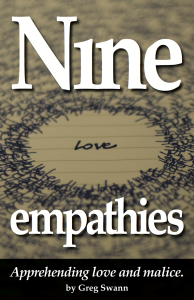
When you praise your kids’ virtues the way you do your dog’s, you’ll love your whole family better.Photo by: wsilver
When you invoke an empathy for the opposite, you are explicitly attempting to empathize with another person in precisely the context where you are least competent to get the job done right. That much is a useful reminder that empathy is all conjecture, based entirely in the false claim that you can “know” something by a means by which valid knowledge cannot be acquired. You can’t read minds, even if it sometimes feels as though you have.
That particular chapter of the book demonstrates why the idea of storgic love – the enduring love of families – is so important for understanding mutually-rewarding expressions of empathy, which are typically the only kind we think about.
This extended extract illuminates how that love is expressed, and how it quickens over time:
I’ll give you an example of the empathy for the opposite that you may not have thought much about, this on the way to exploring another one that you may never even have considered.
So: It is easy to understand that the relationship you have with your dog is an empathy for the opposite. The things that make him least like you give you the most trouble connecting, but the things that make him most like you – your shared love for playing and cuddling together – are the basis of the bonds of storgic love between you.
Yes, people can love animals and animals people. This is well known to anyone who doesn’t shield his mind from facts with a clipboard. Human storgic love is mammalian in origin, not a product of human conceptual cognition. This is why you and your dog can love each other so completely – with him loving you far more than you love him – and why your dog would never think twice about risking his own death to protect your safety.
Oh, yeah. Your dog can’t think, just feel, but that’s the point: Empathy is a feeling, and all of our emotions emerge from our animal heritage, not from our more-recently-upgraded abstract conceptual capability. Storgic love – not mammary glands – is the essential defining characteristic of mammals as a class of organisms. How do all mammals express their storgic love? Oh, yeah. By playing and cuddling.
I can give you a name for your mental state and your dog’s when the two of you are cuddling playfully: Enloved. You are in a state of love for your dog, and you are expressing that with very loving acts. And your dog is in that same state, reciprocally. But both of you are so thoroughly doing what you’re doing that there is no meaningful way to distinguish the loving from the being loved, with each being, or at least seeming to be, the expression of the other.
You are not loving each other, you are enloving together, each of you playing joyously and without any other thought within a warm, sweet, comforting and delightful subjunctive orb of love. You are most loving to and best loved by your spouse and your children when you are mutually-enloved in this way – when everything you do is first and best an expression of the cuddly playfulness you may until now have experienced most often with pets, not people.
But this is empathy for the person by means of empathy for the opposite: When you play with him like this, you are living most like a dog, him least like a human being. You love your dog the least when he fails to behave appropriately according to human expectations. Your dog loves you the most when you are most thoroughly living up to his expectations of what a normal mammal should do – play and cuddle.
Here’s the part you probably have not considered: Your children are full-time mammals for the first five years of their lives or so, only slowly growing into their humanity, with the graduation to full conceptual consciousness – the child thinking fluently all the time in abstract notation systems – occurring as a world-shaking epiphany in the child’s mind.The Grand Unifying Theory of Human Motivation – as taught to me by a turtle, and by an eternally-outraged human reptile.To read more about empathy, see me, feel me, touch me, heal me at Amazon.com.
Until that time, how can you best express your love for your child? By cuddling and playing, with any cultivation of the child’s talents and abilities being incorporated essentially subversively into that cuddly playfulness. How can you best make your child feel like an exploited Dancing Bear or an irredeemably failed compliance-bot – a thing crafted to disappoint grandmothers by repeatedly failing to recite the full alphabet on command? Pretty much just like you’re doing.
The thing that makes your children children is the thing that is most opposite your adulthood. To react to them in a way that is most beneficial to them, you must deploy the empathy for the opposite in much the same way you do with your dog. When you praise your kids’ virtues the way you do your dog’s, you’ll love your whole family better.
Meanwhile, what is the real-life referent for a wife’s so-called feminine intuition? Her much greater fluency in the empathy for the opposite – even, do note, to the point of empathizing with mental states her husband does not experience. What is the greatest risk to a man’s marriage? Arguably it’s that he never once thought about an empathy for the opposite until today. She knows he’s strange and different from her. He thinks she’s batshit crazy half the time. It doesn’t take a lot of empathy for the future to figure out how that story ends.
Every expression of empathy, acted upon or not, is a guess, and it is in the empathy for the opposite that your erroneous guesses are likely to have the most momentous and significant enduring consequences.
My way of thinking about empathy is more thoroughgoing than anything you’ve read before. Even so, Nine empathies is a quick read. If you’ll give me 90 minutes of your time, I’ll give you a whole new way of managing your enloving relationships.
















